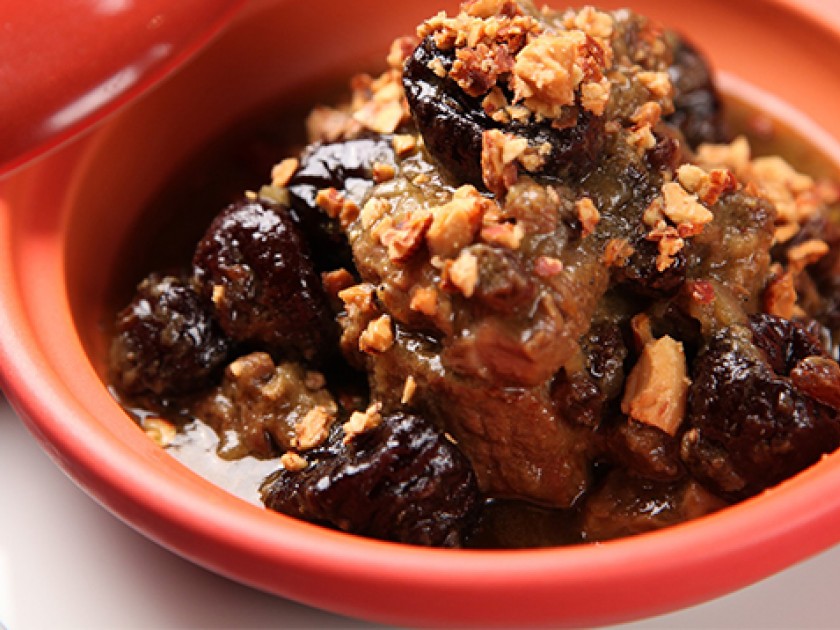Join a community of readers who are committed to Jewish stories
Sign up for JBC’s Nu Reads, a curated selection of Jewish books delivered straight to your door!

I hardly expected to travel halfway around the world to encounter my grandmother’s ghost, but that is what happened to me a few years ago in Tangiers. Or at least that is how I’ve come to think of that moment. It was, for me, as if she had come back from the dead.
We had been traveling for two days across the ocean to Madrid, by train to Málaga, across the Straits of Gibraltar and now Tangiers. It was late, and we were starving. When had we last eaten? Coffee that morning in Málaga? A cheese sandwich on the ferry? But that was hours ago. Now we were making our way to an old Moroccan restaurant I’d circled in the guidebook.
In the winding alleyways, stores were shuttering their windows. Moroccan women in kaftans, heads covered, scurried along on last minute errands. In a café, men in pink and green djellabas sat, sipping mint tea. Other men, hooded, pushed past us. A donkey cart filled with wood almost pinned us to the wall in the narrow maze of street. I asked a group of boys directions and, laughing, they sent us the wrong way.
Soon we found ourselves hopelessly lost. A shopkeeper who spoke French drew us a map. Half an hour later we were climbing the stone steps that led to our restaurant. But the minute we stepped inside, I was uncertain. It looked like a place for tourists. The waiters wore fezzes and there were four musicians sitting with a tip jar in front of them. The only other people in the restaurant were a large French family who seemed to be celebrating somebody’s birthday.
I was hoping for something funkier, but the place was clean, the people seemed nice, and we were exhausted. When the waiter asked if I’d like a drink, I decided to take a chance. “Do you have any wine?” He shook his head sadly. I’m sure it’s not the first time he’d heard the question.
“We have fresh apricot and pomegranate juice,” he told me. I ordered the pomegranate juice and lamb tagine; Larry ordered chicken couscous. The music was lively and we were enjoying the place. It wasn’t long before our food arrived, and, as the waiter lifted the lid of my tagine, the steaming aromas revived me. I took a bite. The lamb was moist and tender, cooked with prunes. I could smell the cinnamon, the ginger, the turmeric. Slowly the flavor seeped into my mouth. I put my fork down. “Is it all right?” Larry asked, concerned.
Tears came to my eyes.
“What is it?” Larry asked, fearing that something was wrong with the food. How could I explain this to him? I felt as if I was eating in my grandmother’s kitchen. My grandmother died in 1973 and, as far as I knew, her recipes died with her. How was it possible that in a restaurant in North Africa I was tasting a meal that my Russian-born Jewish grandmother made for me in Chicago, when I was a girl?
“My grandmother made this dish,” I said.
“You mean she made something like this?”
I shook my head. “No, this is her recipe.”
This dish of lamb with prunes sent me on an odyssey that led to the writing of my new novel, Gateway to the Moon. Part of my journey had to do with the history of food. What I learned didn’t surprise me, but it was something I had never thought of before. Food can have its own diaspora. Recipes migrate with the people who cook them. I had no idea where to find my ancestors until lamb with prunes showed me the way. It was my first clue and it became an integral part of the story.
Five hundred years ago the Spanish expelled its Muslim and Jewish populations. Not only did they banish the people&dashthey banished their food. Spices such as cinnamon, ginger and cumin disappeared. In Andalusia they killed the sheep and goats and brought in pigs by the thousands, because they knew that those Jews and Muslims who held onto their rituals in secret would never eat their pork. The Jews who were expelled went in many different directions — some to Portugal, where they would all be forcibly converted. Others found their way to France. Some made it to the Ottoman Empire. And others went to North Africa.
If my family was banished from Spain, it is possible they went to North Africa. From there you can go directly up the Aegean, up the Dardanelles, to the Sea of Marmara and up the Bosphorus to the Black Sea, which is where I know they came from. A village not far from Kiev. By water it is a straight shot.
I’ve always felt at home in the Mediterranean. It is a feeling that’s hard to describe. The water, the air, the way the sun touches my skin. My husband has commented on it over the years. “It’s as if you belong here,” he likes to say. And so now I think about it. Maybe I do.
Mary Morris is the author of numerous works of fiction, including the novels Gateway to the Moon, The Jazz Palace, A Mother’s Love, and House Arrest, and of nonfiction, including the travel classic Nothing to Declare: Memoirs of a Woman Traveling Alone. Morris is a recipient of the Rome Prize in Literature and the 2016 Anisfield-Wolf Book Award for Fiction. She lives in Brooklyn, NY.